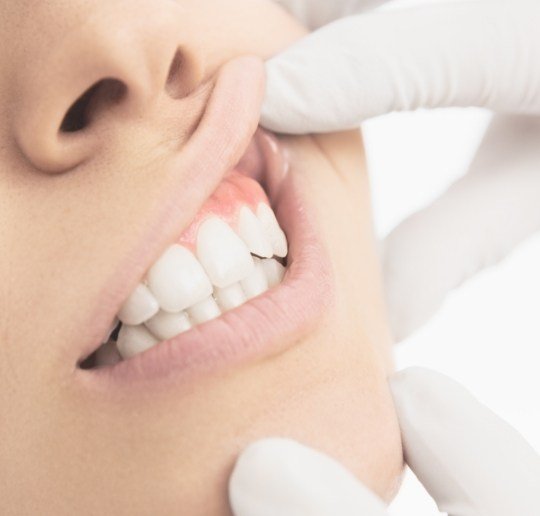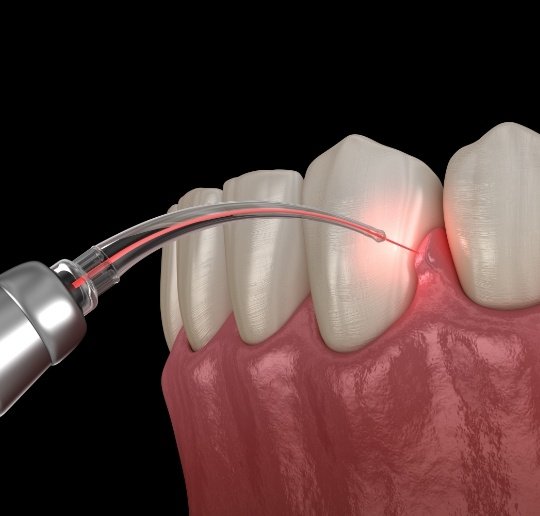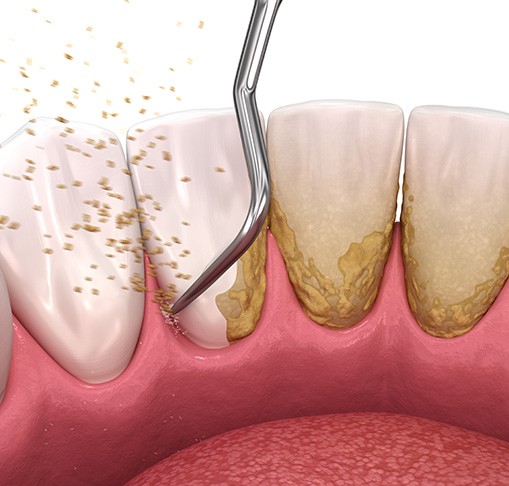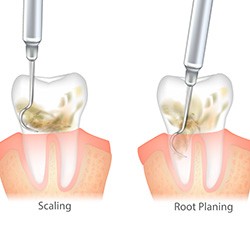Gum Disease Treatment – Gahanna, OH
Stop the Harmful Impact of Gum Disease
Gum disease, or periodontal disease as it’s called by your dentist, is one of the most common oral health concerns affecting US adults. In fact, studies indicate that as much as 50% of adults over the age of 30 struggle with some level of gum disease. After the age of 35, that percentage goes up to 80%, and for adults in this demographic, gum disease is the leading cause of tooth loss. Additionally, gum disease has been linked with numerous whole-body health concerns, including heart disease, diabetes, and pre-term births. With statistics like these, it will come as no surprise that the Claybrooke Dental of Gahanna team takes prevention of this oral health condition very seriously.
We screen for early warning signs of gum disease during every dental checkup, and we provide a variety of periodontal therapies to renew oral health and avoid the risks to your health that come with gum disease. If you want to learn more about periodontal disease, please contact us to schedule an appointment in our Gahanna dental office. You can also feel free to ask about our periodontal screening and gum disease treatment in Gahanna, OH during your next dental checkup.
Why Choose Claybrooke Dental of Gahanna for Gum Disease Treatment?
- Focus on Preventive Care & Patient Education
- We Accept Dental Insurance
- Comfortable & Organic Dental Office
What is Periodontal Disease?

Periodontal disease occurs when plaque and tartar buildup accumulate at or below the gum line. When this happens, the soft tissue can be irritated, infected, or inflamed. Without treatment, the soft tissue and supportive alveolar bone tissue that holds your teeth in place begin to deteriorate. This allows your teeth to move in their sockets and can eventually lead to tooth loss. Additionally, the accumulation of plaque and tartar that leads to gum disease can also cause tooth decay, so many patients need to treat both the decay and the gum disease to ensure effective results.
There are two stages of gum disease. In the early stage called gingivitis, the symptoms are very mild and can go unnoticed by patients. Gingivitis is typically treatable and can be completely cleared up. In the more advanced stage called periodontitis, gum disease becomes a chronic illness that you will need to treat for the rest of your life.
Signs of Gum Disease

The only way to know for sure is to schedule an appointment with our team, but some of the warning signs of gum disease you should be aware of include:
- Bleeding gums
- Inflammation or infection in the gums
- Irritated or swollen gums
- Teeth that feel loose
- Chronic bad breath that doesn’t improve after brushing or using mouthwash
What Periodontal Therapies are Available?

We offer a wide range of periodontal therapies based on your unique oral health needs. Patients with very mild gingivitis can typically renew their oral health with more frequent professional teeth cleanings. Patients with more advanced periodontitis will likely need to receive one or more advanced periodontal therapies in addition to maintaining more frequent dental cleaning appointments. Some of the periodontal therapies we may consider include:
- Scaling – removal of plaque and tartar at or below the gum line
- Root planing – smoothing of tooth roots to prevent future plaque and tartar buildup
- Antibiotic therapy – we may recommend oral or topical antibiotics to reduce the numbers of plaque-producing bacteria in the mouth
Scaling & Root Planing

Scaling and root planing is a common way to treat gum disease before it progresses and becomes severe. This is a two-part process. The first part of the procedure consists of a thorough cleaning along and beneath the gumline. Then, the roots of the teeth are smoothed down to promote healing. Continue reading to learn more about scaling and root planing and if it’s right for you.
Do I Need Scaling & Root Planing?

Scaling and root planing is often referred to as a “deep cleaning.” If we pick up on any signs of gum disease, such as bleeding, swelling, and inflammation, we will address it as quickly as we can to prevent it from progressing and resulting in permanent damage to the gums and surrounding structures. The purpose of this treatment is to remove bacterial buildup around and beneath the gumline before smoothing down the roots to allow the area to heal more easily.
The Process of Scaling & Root Planing

Scaling and root planing usually take place over two separate appointments. The first one consists of the “scaling.” This is when we scrape away plaque and tartar that have accumulated along and beneath the gumline using dental instruments.
Once the scaling portion is complete, we will move on to the root planing portion. At this point, we will smooth down the parts of the teeth that are normally hidden beneath the gum tissue. This allows the gums to adhere to the teeth with more ease, making it more challenging for bacteria to accumulate again in the future. This also reduces your risk of developing gum disease again later.
Aftercare Tips for Scaling & Tooth Planing

It’s common for patients to experience sensitivity of the gum tissue after scaling and root planing treatment. You may also have some minor swelling in the area. This is normal and temporary, so it should go away on its own. Here are a handful of tips to help you recover quickly:
- Brush twice daily with a soft-bristled toothbrush
- Use a saltwater rinse after eating
- Floss thoroughly every day
- Stick to a soft-food diet for 48 hours after your treatment
- Avoid spicy, acidic, and hot foods
- Refrain from intense physical activity immediately after treatment
Is Gum Disease Cured after Treatment?

Not usually. For patients with very mild gum disease, gingivitis, we may be able to completely renew your oral health. However, advanced periodontitis is a chronic illness. Like other chronic disease, it will need to be monitored and treated for the rest of your life. With proper care, you should not have to worry about the adverse oral and overall health effects associated with gum disease, but you will need to be on your guard against these health concerns for the rest of your life.
